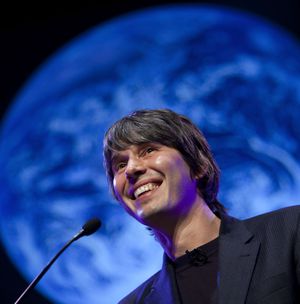Professor Brian Cox talks ahead of Birmingham show
The world record for tickets sold for a science show was held by Professor Brian Cox. That was until another man came along and smashed it to smithereens.

His name was, you guessed it, Professor Brian Cox.
The multiple-world-record holder sold 75,000 for a previous tour. But his latest Professor Brian Cox Live shows will seem him performed to around 150,000 people – twice as many as his previous run.
And Brian can’t wait to get into some of the UK’s biggest venues – including Birmingham’s Barclaycard Arena tonight – to talk about science.
He will take audiences on a dazzling journey through space and time, delving into ‘high science’ and freewheeling on the edges of the known cosmos. Whether an avid science reader or a total novice, Professor Brian Cox Live will test the limits of our knowledge and make highly complex ideas accessible to all.
He plans to take science to a new dimension in a show hosted by Infinite Monkey Cage co-host Robin Ince.
Brian’s excited about the prospect of hitting the road because he would be able to use massive screens to properly showcase the ‘beautiful’ high resolution imagery of various galaxies from the Hubble Space Telescope.
He says: “The exciting thing about these, from the (shows) before Christmas, we’re in really big venues.
“We have a really big screen, a ridiculous screen – it’s a state of the art LED display, it’s something like 30m wide and 15m high.
“It’s huge, and what you realise is the images we’ve now got from the Hubble and Cassini, which has been in the news a lot over the last few weeks, they’re such incredible high-res images, when you put them on screens like that and fill arenas with them, they look spectacular.
“I don’t think anyone ever gets a chance to do it, to give them the presentation they deserve because they are beautifully detailed, and that’s the most exciting thing.”
Brian has presented numerous science programmes for the BBC and has been described by Sir David Attenborough as his natural successor. He has spoken about astronomy and physics and hopes to give people the enthusiasm to learn.
He says: “They will know more in the sense that they might not have thought about the vastness of the universe, but one of the only things you can aim to do in a show is to trigger a desire to learn more, because you can’t even begin to scratch the surface of what we know.”
On his present tour, he hopes to answer people’s questions about the meaning of life and the possibility of aliens with his shows.
“That’s why I’m doing this tour, so I can answer them once and for all. I should add that I don’t know the answer to either of those questions – I’ll give my opinion.”
Brian has been thrust into the spotlight and some have questioned the way science has moved into the mainstream and been used as entertainment.
However, he believes it is healthy for people to learn more – providing they are basing their opinions on fact.
“One has to be careful when communicating uncertainty in science, especially in politicized areas such as climate science. The reason is that uncertainty is often misunderstood and occasionally misused by self-styled ‘on-line magazine editors’ or opinion formers ‘who are always right’ – you know the sort.
“But surely it isn’t a bad thing to challenge a scientific theory or prediction? Isn’t the reason for the success of science the fundamental axiom, if you like, that all theories or predictions MUST be falsifiable, and are NEVER to be assumed to be absolutely correct? And doesn’t the very requirement of the falsifiability of any theory or prediction demand that someone should try to falsify them? Yes, to all of the above.
“BUT, there is statement that I believe to be correct, and can be made with certainty. It is this: The consensus scientific view is the best we can do at any given time, given the available data and our understanding of it.
“It is not legitimate and certainly of no scientific value (although there may be political value) to attack a prediction because you don’t like the consequences, or you don’t like the sort of people who are happy with the prediction, or you don’t like the people who made the prediction, or you don’t like the sort of policy responses that prediction might suggest or encourage, or even if you simply see yourself as a challenger of consensus views in the name of some ideal or other. It is only appropriate to criticise a prediction or theory based on specific criticisms of the data, methodology or the underlying theoretical framework. It is content-less to criticize a scientific prediction because you don’t like it.”
Brian was born in Oldham and now lives in London after writing, or co-writing, more than 950 scientific publications. He was an entertainer before becoming a TV scientist, playing the keyboards for D:Ream and Dare.
He’s won numerous awards and in 2002 he was elected an International Fellow of The Explorers Club and in 2006 he received the British Association’s Lord Kelvin Award for this work.
He held a prestigious Royal Society University Research Fellowship from 2006 to 2013 and in 2010 won the Institute of Physics Kelvin Prize for his work in communicating the appeal and excitement of physics to the general public.
He was appointed OBE in the Queen’s 2010 Birthday Honours for services to science and in 2011, he won Best Presenter and Best Science/Natural History programme by the Royal Television Society for Wonders of the Universe. A year later, he was awarded an honorary doctorate by the Open University.





